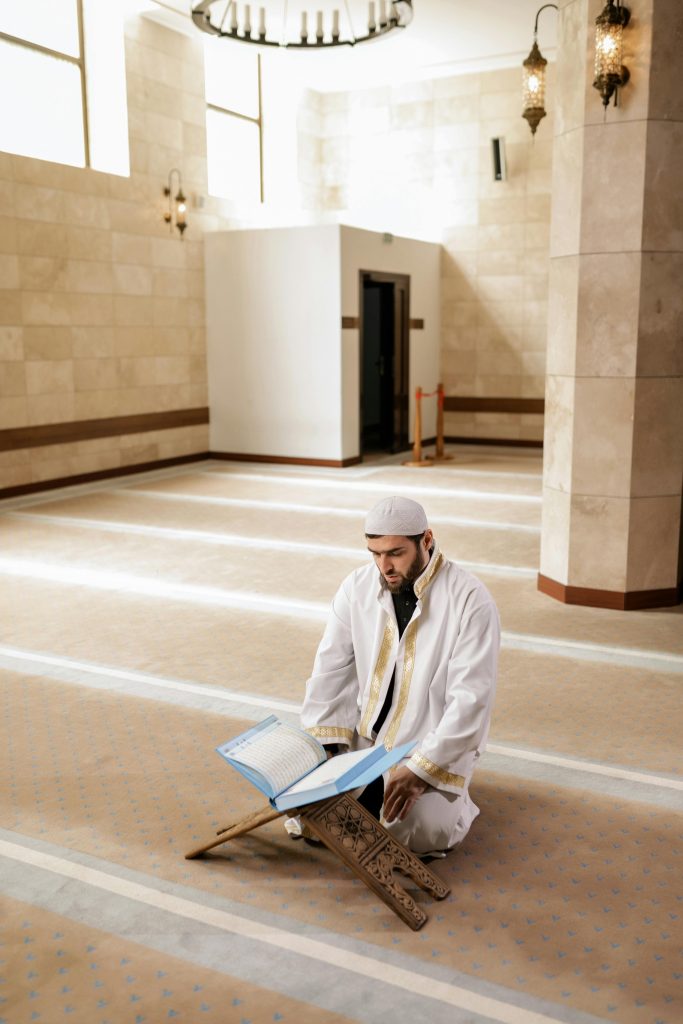
In the intricate tapestry of Islamic teachings, mercy in Quran and in Islam emerges as a central thread, weaving through the Quran’s verses, the Hadiths’ sayings of Prophet Muhammad (peace be upon him), and the stories that illuminate the faith. It’s a profound concept, embodying not just the Creator’s benevolence but also the essence of faith itself. Understanding mercy in Islam is a journey that traverses the depths of belief and the heights of compassion, guided by divine revelation and exemplified by the noblest of characters.
Mercy in the Quran (The Quran is the first reference to apply the mercy in Islam)
The Quran is Islam’s sacred scripture, resounds with verses extolling the boundless mercy of Allah. Surah Al-Fatihah, the opening chapter, begins with “In the name of Allah, the Most Gracious, the Most Merciful,” setting the tone for the entire revelation. It reminds that every chapter, every verse, is imbued with divine mercy, encompassing all of creation.
In Surah Al-Anbiya, verse 107, Allah declares, “And We have not sent you, [O Muhammad], except as a mercy to the worlds.” Here, Prophet Muhammad (peace be upon him) is described as a mercy not just to humanity but to all existence. His life, teachings, and actions epitomize mercy, serving as a beacon for believers to emulate.
Mercy in the Hadiths (The hadith is the second reference to apply the mercy in Islam)
The Hadiths, collections of sayings and actions of Prophet Muhammad (peace be upon him) further illuminate mercy in Islam. In one Hadith narrated by Abu Huraira, the Prophet said, “Allah is merciful and loves mercy. He gives to the merciful and protects them. Be merciful to those on earth, and He who is in the heavens will be merciful to you.”
This Hadith encapsulates the reciprocal nature of mercy in Islam. It’s not merely a passive attribute but a dynamic force shaping relationships and cultivating compassion. By showing mercy to others, believers open themselves to the boundless mercy of their Creator.
Stories of Mercy
Throughout Islamic history, countless stories illustrate the transformative power of mercy. One such tale is of a woman forgiven for her sins due to her compassion towards a thirsty dog. Found in various Hadith collections, it underscores mercy’s importance in attaining divine forgiveness.
Another poignant narrative is of Prophet Muhammad’s forgiveness of his staunchest opponents after the conquest of Mecca. Despite years of persecution and enmity,
he chose to extend mercy and forgiveness, embodying the highest ideals of compassion and magnanimity.
Faith and Mercy: Inseparable Bonds
In Islam, faith and mercy are inseparable, nurturing and sustaining each other. Faith, or iman, isn’t merely a set of beliefs but a lived experience grounded in recognizing God’s mercy. It inspires believers to embody mercy in thoughts, words, and deeds, following the Prophet’s example.
As Allah says in Surah Al-Anfal, verse 63, “And He has put affection between their [believers’] hearts. If you had spent all that is in the earth, you could not have put affection
between their hearts, but Allah has done it.” This verse highlights faith’s role in fostering bonds of compassion and empathy among believers.
Conclusion
In Islamic teachings, mercy emerges as a radiant thread, illuminating the path of faith and guiding believers towards their Creator’s benevolence. Through Quranic verses, Hadiths, and stories of Prophet Muhammad (peace be upon him), Muslims are reminded of mercy’s transformative power and its integral role in their faith.
As believers strive to embody mercy, they’re reminded of Allah’s words in Surah Al-A’raf, verse 156, “My mercy encompasses all things.” It transcends boundaries, embraces diversity, and beckons believers to cultivate compassion in every facet of their existence.
In the embrace of mercy, faith finds its fullest expression, and believers discover the true essence of Islam: a religion rooted in love, guided by mercy, and illuminated by the divine light of compassion.
If you are interested, you can visit our courses and have a tour in the page https://arabyplus.net/live-courses/







